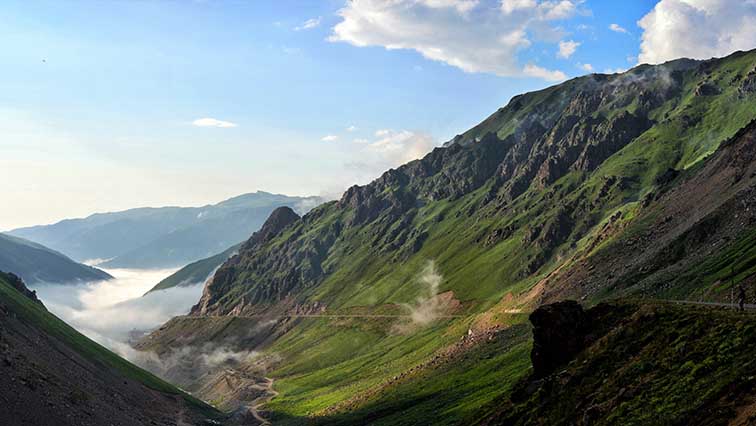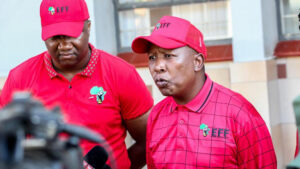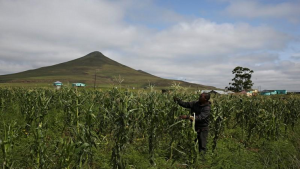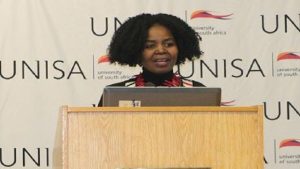The debate about land expropriation and ownership is seemingly far from a conclusion. Communal land and that under the custodianship of traditional leaders is a hot topic in this debate.
Something the people from rural Eastern Cape are well aware of and how the talk of expropriation might affect them.
The land here is home to people along the Wild Coast and its ancestral value is priceless as Chief of Coffee Bay Ngwenyathi Tyelinzima Pali explains, “As the Tshezi people, we come from KwaZulu-Natal. We came during the time of the wars and our forefathers came here to the Pondo Land, crossing the Mthatha River. We got here and there was no-one. History has it that our forefathers stayed here and ruled over this land.”
Coffee Bay and Port st Johns are also globally known for their natural beauty. The land here is sought after and extremely valuable and it has for many years been earmarked for development.
Chief of Port St Johns Afrika Zwelethu Fono explains, “After the settlers came here they moved our great grandparents and their community. They moved from what you know as Port St Johns to here, where we are at Caguba Village. After Mandela’s release, we got our rights back. We did a land claim and it was successful – but the thing is some of the portions weren’t complete and even the settlement agreement is not right. We don’t even have the title deeds, we can’t even move invaders, and we must consult with the municipality.”
Land Specialist Mike Coleman says that government has over the years talked about developing these towns and making them prime tourist destinations to in turn create better lives for the people of the areas.
But much of it is deemed communal land and not meant to be sold. Communal land is not quantified in monetary terms.
“Saying that it is illegal to sell land under communal land, one must come from that community, ask be accepted by community and is them embraced and known by community as one of their own”
Chief of Coffee Bay Pali explains how they allocate land, “When we are allocating land, the sub headman comes to the great place to introduce whoever wants a site, here at our place there is no objection when one wants to have a site and we have no price to sell land here. According to government our land is communal land and it cannot be purchased.”
The Chief of Port St Johns says that you have to show gratitude, “First of all you must go to the sub headman, and then the headman, introduce yourself, and the headman will take you to the chief and introduce yourself, there are things you must do. You are not buying the site but you do what we call imbuso, which is a way of showing gratitude, then we have two categories, a residential and business.”
The wild coast is breathtakingly beautiful and a tourism jewel but the area is impoverished and under utilised by tourists.
The traditional leaders are seeking to empower their people to improve their livelihoods. Developments in the tourism sector are on the up in the area but even on this front there are many empty promises.
“Sometimes the white man comes and talks about development and as a community we are always looking for development the Tshezi people want development,” says Chief Pali.
But the land does get sold and poverty stricken people are desperate for a way out. It is often sold with no paper trail for ridiculous amounts, a piece of land for as little as R2000.
Fezile Bodla explains that it seems a lack of knowledge and the understanding of the asset attached to land that remains a challenge.
“The only trick is that they don’t tell them what you can get for the land over a long period. People take cash and its gone quick. These people must be exposed; we must learn how to use this land. Don’t sell your land, rent it out, sign a long lease – otherwise it will cost you and your grandchildren.”
Chief Spokesperson Nkosi Jongisile Mbambazela says that they don’t intervene in individual’s decisions.
“When people from the community want to give a person a piece of their land in their garden, we don’t know what the deal is and we do not sell land. We do not intervene with community members who have their own land and decide to sell it off. Once we have allocated land, we can no longer intervene to tell people who can live there or how must their land be used.”
Fono says that most community members don’t follow procedure.
“What is happening is that some of the members of the communities just take money from the foreigners, not following procedure and people start shops etc. No one has the right to sell land, just the structure; one must go to the sub headman and chief and transfer site so that it can be official.”
Community elder Dolphus Fono doesn’t believe that they benefit from the prime land they live on
“No, we don’t see the benefits of the rich land that we have here, as community members we don’t see the riches of the beach and views and the land.”
Community member Sylvia Dave shares this sentiment, “I was born here and I’ve been here since the 70s. We get nothing from the land because we never got any land. This is how we live, I sell from this place and over the weekends I start a fire to braai and sell food, this is how we live.”
The youth here want jobs or land to create jobs as Zanozuko Khulani explains.
“We have a problem, if we want a car wash, we need land. The problem is that the municipality doesn’t want to give us land to get our car wash business started. They won’t build it for us. The problem is that we fighting for it and now we are waiting for it, because we will work and there will be no more crime.”
The people from the Wild Coast hope the current process around land expropriation will eventually bear fruit and impact positively on them.






